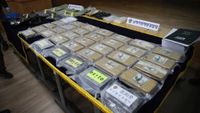In a significant crackdown on drug trafficking, South Korean authorities have seized approximately 1 ton of cocaine hidden aboard a foreign cargo ship, marking the largest drug seizure by volume in the nation's history. The operation took place on April 2, 2025, at a port in Gangneung, located in Gangwon Province, where about 90 personnel from the Donghae Regional Coast Guard and Seoul Regional Customs were deployed to search the vessel.
The cargo ship, flying the Norwegian flag, was reportedly on a journey that began in Mexico, passing through Ecuador, Panama, and China before docking in South Korea. The authorities acted on a tip-off from the U.S. Federal Bureau of Investigation (FBI), which led them to investigate the ship.
Upon searching the vessel, officials discovered 50 boxes, each containing approximately 20 kg of cocaine, cleverly concealed within the ship's cargo. The estimated market value of the seized cocaine is around 500 billion won, equivalent to approximately 341.7 million USD. This operation is a significant milestone in South Korea's ongoing battle against drug trafficking.
As part of their investigation, South Korean authorities are scrutinizing the ship's captain and crew to ascertain the origin and intended destination of the illicit drugs. Additionally, they are collaborating with the FBI and U.S. Homeland Security Investigations (HSI) to expand their inquiry into potential links with international drug trafficking organizations.
The implications of this seizure are vast, highlighting not only the scale of drug trafficking operations that can reach South Korea but also the international collaboration required to combat such crimes. The cooperation between U.S. and South Korean authorities underscores a shared commitment to tackling the global drug trade.
This incident comes amid a broader context of rising drug-related activities in the region. Authorities have noted an uptick in the trafficking of various narcotics, prompting increased vigilance and enforcement efforts. The successful seizure of this substantial quantity of cocaine serves as a reminder of the persistent challenges faced by law enforcement agencies.
Moreover, the operation sheds light on the complexities involved in tracking and intercepting drug shipments that traverse multiple countries. The route taken by the cargo ship—from Mexico to South Korea—illustrates the extensive networks utilized by traffickers to evade detection and deliver drugs to markets.
The South Korean government has been proactive in enhancing its maritime security measures to address the growing threats posed by drug trafficking. This includes bolstering the capabilities of the Coast Guard and Customs Service, as well as fostering international partnerships to improve intelligence sharing and operational coordination.
In addition to the cocaine seizure, recent operations have also targeted other substances, reflecting a comprehensive approach to drug enforcement. For instance, authorities have recently arrested 16 individuals, including seven from China and Taiwan, and confiscated 1.4 tons of ketamine along with 80 tons of chemicals used in drug production.
This multifaceted strategy highlights the interconnected nature of drug trafficking, where various substances are often linked to broader criminal enterprises. The ongoing efforts by South Korean authorities aim to dismantle these networks and reduce the availability of drugs within the country.
The seizure of this cocaine shipment is not just a victory for South Korean law enforcement; it serves as a crucial step in the fight against drug trafficking on a global scale. As countries continue to grapple with the complexities of drug-related issues, the need for cooperation and robust enforcement strategies becomes increasingly apparent.
As investigations proceed, the spotlight remains on the international drug trade and the efforts to combat it. The collaboration between South Korean authorities and U.S. agencies exemplifies the importance of a united front in addressing the challenges posed by drug trafficking.
In conclusion, the recent seizure of cocaine aboard a foreign cargo ship is a landmark event in South Korea's ongoing battle against drugs. It underscores the critical need for vigilance, international cooperation, and comprehensive strategies to combat the pervasive threat of drug trafficking.






